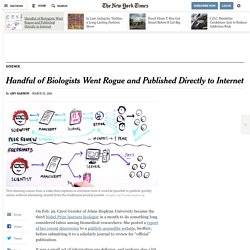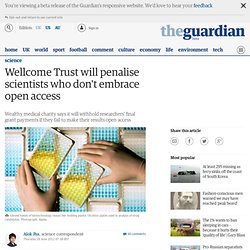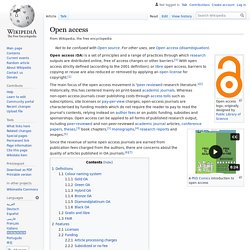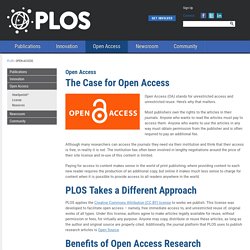

Wellcome Open Research provides all Wellcome researchers with a place to rapidly publish any results they think are worth sharing. NASA in PMC. Handful of Biologists Went Rogue and Published Directly to Internet. Photo On Feb. 29, Carol Greider of Johns Hopkins University became the third Nobel Prize laureate biologist in a month to do something long considered taboo among biomedical researchers: She posted a report of her recent discoveries to a publicly accessible website, bioRxiv, before submitting it to a scholarly journal to review for “official’’ publication.

It was a small act of information age defiance, and perhaps also a bit of a throwback, somewhat analogous to Stephen King’s 2000 self-publishing an e-book or Radiohead’s 2007 release of a download-only record without a label. To commemorate it, she tweeted the website’s confirmation under the hashtag #ASAPbio, a newly coined rallying cry of a cadre of biologists who say they want to speed science by making a key change in the way it is published. Continue reading the main story Continue reading the main story Continue reading the main story Continue reading the main story. ScienceHuβ LLC. FreeFullPDF.com. Wellcome Trust will penalise scientists who don't embrace open access. The Wellcome Trust plans to withhold a portion of grant money from scientists who do not make the results of their work freely available to the public, in a move that will embolden supporters of the growing open access movement in science.

In addition, any research papers that are not freely available will not be counted as part of a scientist's track record when Wellcome assesses any future applications for research funding. The trust is the second largest medical research charity in the world, spending more than £600m on science every year. Its director, Sir Mark Walport, is a firm supporter of open access to scientific research as a way to ensure scientific results are available to as wide a range of people who might benefit from them as possible. He has said that publishing research papers should be considered a cost of a research project in the same way as a piece of lab equipment. Future applications for research money or renewal of grants will also be affected. Open Access to Scholarly Publishing. 8,200+ Strong, Researchers Band Together To Force Science Journals To Open Access. Evolutionary biologist Michael Eisen made this t-shirt design in support of the Elsevier boycott.

Academic research is behind bars and an online boycott by 8,209 researchers (and counting) is seeking to set it free…well, more free than it has been. The boycott targets Elsevier, the publisher of popular journals like Cell and The Lancet, for its aggressive business practices, but opposition was electrified by Elsevier’s backing of a Congressional bill titled the Research Works Act (RWA). Though lesser known than the other high-profile, privacy-related bills SOPA and PIPA, the act was slated to reverse the Open Access Policy enacted by the National Institutes of Health (NIH) in 2008 that granted the public free access to any article derived from NIH-funded research.
But the fight for open access is just getting started. Seem dramatic? Paying a high price for academic journals isn’t anything new, but the events that unfolded surrounding the RWA was the straw that broke the camel’s back. eLife - the funder-researcher collaboration and forthcoming journal for the best in life science and biomedicine. Publish your bachelor or master thesis, term paper, dissertation and essay. Wikibooks.
Multimedia Educational Resource for Learning and Online Teaching. Online Textbooks, eTextbooks. Connexions - Sharing Knowledge and Building Communities. Proceedings of Science. Home : Nature Precedings. Language Documentation & Conservation (LD&C) Welcome to perspectivia.net — perspectivia.net. Revistas CSIC: revistas electrónicas del Consejo Superior de Investigaciones Científicas (CSIC) Directory of Open Access Journals. Open access. Research publications that are distributed online, free of cost or other access barriers Open access (OA) is a set of principles and a range of practices through which research outputs are distributed online, free of cost or other access barriers.[1] With open access strictly defined (according to the 2001 definition), or libre open access, barriers to copying or reuse are also reduced or removed by applying an open license for copyright.[1] The main focus of the open access movement is "peer reviewed research literature.

"[2] Historically, this has centered mainly on print-based academic journals. Whereas conventional (non-open access) journals cover publishing costs through access tolls such as subscriptions, site licenses or pay-per-view charges, open-access journals are characterised by funding models which do not require the reader to pay to read the journal's contents. Definitions[edit] Colour naming system[edit] Gold OA[edit] Green OA[edit] Green OA is gratis for the author. FAIR[edit] Open Access Scholarly Publishers Association. Theses and dissertations - www.tesionline.com - share your knowledge. Open Access. The Case for Open Access Open Access (OA) stands for unrestricted access and unrestricted reuse.

Here’s why that matters. Most publishers own the rights to the articles in their journals. Anyone who wants to read the articles must pay to access them. Anyone who wants to use the articles in any way must obtain permission from the publisher and is often required to pay an additional fee. Although many researchers can access the journals they need via their institution and think that their access is free, in reality it is not.
Paying for access to content makes sense in the world of print publishing, where providing content to each new reader requires the production of an additional copy, but online it makes much less sense to charge for content when it is possible to provide access to all readers anywhere in the world. PLOS Takes a Different Approach PLOS applies the Creative Commons Attribution (CC BY) license to works we publish.